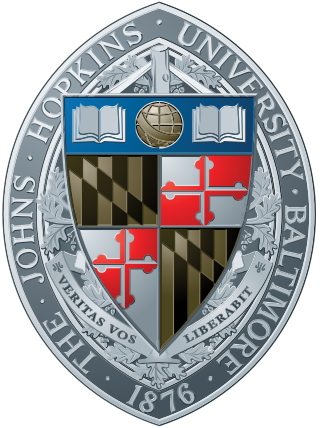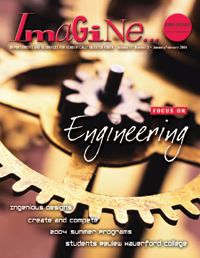
Johns Hopkins University is a private research university in Baltimore, Maryland. Founded in 1876, Johns Hopkins was the first U.S. university based on the European research institution model.

The Johns Hopkins Center for Talented Youth (CTY) is a gifted education program for school-age children founded in 1979 by psychologist Julian Stanley at Johns Hopkins University. It was established as a research study into how academically advanced children learn and became the first program to identify academically talented students through above-grade-level testing and provide them with challenging learning opportunities.
Gifted education is a sort of education used for children who have been identified as gifted and talented.

The Centre for Talented Youth Ireland (CTYI) is a programme for students of high academic ability between the ages of six and seventeen in Ireland.

The Education Program for Gifted Youth (EPGY) at Stanford University was a loose collection of gifted education programs formerly located within Stanford Pre-Collegiate Studies program. EPGY included distance and residential summer courses for students of all ages. Many of the courses were distance learning, meaning that courses were taught remotely via the Internet, rather than in the traditional classroom setting. Courses targeted students from elementary school up to advanced college graduate. Subjects offered included: Mathematics, English, Humanities, Physics, and Computer Science. Stanford Pre-Collegiate Studies is similar to the Center for Talented Youth at the Johns Hopkins University in terms of certain objectives. The EPGY courses themselves were offered by a number of institutions including Stanford and Johns Hopkins.
Elaine Tuttle Hansen is an American academic administrator, scholar and university professor who served as the executive director of the Center for Talented Youth at Johns Hopkins University from 2011 to 2018 and the 8th President of Bates College from 2002 to 2011.

Pre-algebra is a common name for a course in middle school mathematics in the United States, usually taught in the 7th grade or 8th grade. The objective of it is to prepare students for the study of algebra. Usually, algebra is taught in the 8th and 9th grade.
Julian Cecil Stanley was an American psychologist. He was an advocate of accelerated education for academically gifted children. He founded the Johns Hopkins University Center for Talented Youth (CTY), as well as a related research project, the Study of Mathematically Precocious Youth (SMPY), whose work has, since 1980, been supplemented by the Julian C. Stanley Study of Exceptional Talent (SET), which provides academic assistance to gifted children. Stanley was also widely known for his classic book, coauthored with Donald Campbell, on the design of educational and psychological research - Experimental and Quasi-experimental Designs for Research.

The School for the Talented and Gifted at the Yvonne A. Ewell Townview Magnet Center is a public college preparatory magnet secondary school located in the Oak Cliff area of Dallas, Texas. The school enrolls students in grades 9-12 and is a part of the Dallas Independent School District. It is known for its liberal arts, Advanced Placement Program and intensive education style. In 2006, 2007, 2009, and 2010 Newsweek named the school the #1 public high school in the United States. In 2012, 2013, 2014, 2015 and 2016, U.S. News & World Report named TAG the #1 public high school in the United States.
Center for Talent Development (CTD), established in 1982, is a direct service and research center in the field of gifted education and talent development based at Northwestern University.
The Julian C. Stanley Study of Exceptional Talent (SET) is an outgrowth of the Study of Mathematically Precocious Youth (SMPY) at Johns Hopkins University. Founded in 1971 by Professor Julian Stanley, SMPY pioneered the concept of above-grade-level testing of middle school students, using the SAT to identify exceptionally talented mathematical reasoners, then offering rigorous academic programs for students who exhibit exceptional reasoning ability.
Elm Thicket is a primarily residential neighborhood in North Dallas, Texas near Love Field airport and the neighborhoods of Love Field, Bluffview, Greenway Parks, University Park and Highland Park.

Anatolia College (Greek: Κολλέγιο Ανατόλια, pronounced[koˈleʝioanaˈtolia], also known as the American College, is a private, non-profit, educational institution located in Pylaia, a suburb of Thessaloniki, Greece. The school has five subdivisions: Anatolia Elementary School, Anatolia High School, Pinewood International School, CTY Greece and ACT, the tertiary division of the institution.
The Study of Mathematically Precocious Youth (SMPY) is a prospective longitudinal survey study of persons identified by scores of 700 or higher on a section of the SAT Reasoning Test before age 13. It is one of the longest-running longitudinal studies of gifted youth. Study scholars have used its data to assess hypotheses about talent development and occupational preferences.
Camilla Persson Benbow is a Swedish-born (Scania) American educational psychologist and a university professor. She studies the education of intellectually gifted students.

The National Academy for Gifted and Talented Youth (NAGTY) was based at the University of Warwick and was founded in 2002 by a government (DfES) initiative for high-achieving secondary students in England. It closed in August 2007, after Warwick University decided not to apply for the new contract.

The PERMATApintar National Gifted Center, UKM, more commonly known as the Malaysian National Gifted Centre, UKM is a gifted center that provides education services for gifted and talented Malaysian students aged 12 – 17 in Malaysia. It was established by University Kebangsaan Malaysia to support the Malaysian Gifted and Talented Program mooted by Datin Seri Rosmah Mansor in 2009. ; wife of the former Prime Minister of Malaysia, Dato' Seri Najib Razak. Universiti Kebangsaan Malaysia under the leadership of then Vice Canselor, Tan Sri Dato Wira Dr. Sharifah Hapsah binti Syed Hasan Shahabudin was appointed as the implementer of the program. Professor Datuk Dr. Noriah Mohd Ishak was then appointed as the first Director of the Malaysian National Gifted Center Pusat PERMATApintar Negara, UKM. Her role was to develop assessment tools to search for the gifted and talented, develop the academic pathways for gifted and talented Malaysian children, develop a comprehensive and challenging curriculum for the gifted and talented Malaysian students and implement the program effectively with the support of UKM, for the benefit of gifted and talented Malaysian students. It is the only programme in Malaysia that identifies academically gifted and talented students. PERMATApintar currently offers three programmes: the Summer Camp programme (PPCS), the PERMATApintar College programme, and the ASASIpintar programme.
Laura Anne Bilodeau Overdeck is an American math education entrepreneur and philanthropist. Overdeck is the founder and president of the Bedtime Math Foundation, a nonprofit that seeks to bring recreational math to children through their parents.
Amy Lynne Shelton is a U.S. cognitive psychology professor and academic administrator serving as the director of the Center for Talented Youth since 2022. She is a professor and associate dean for research at the Johns Hopkins School of Education.









